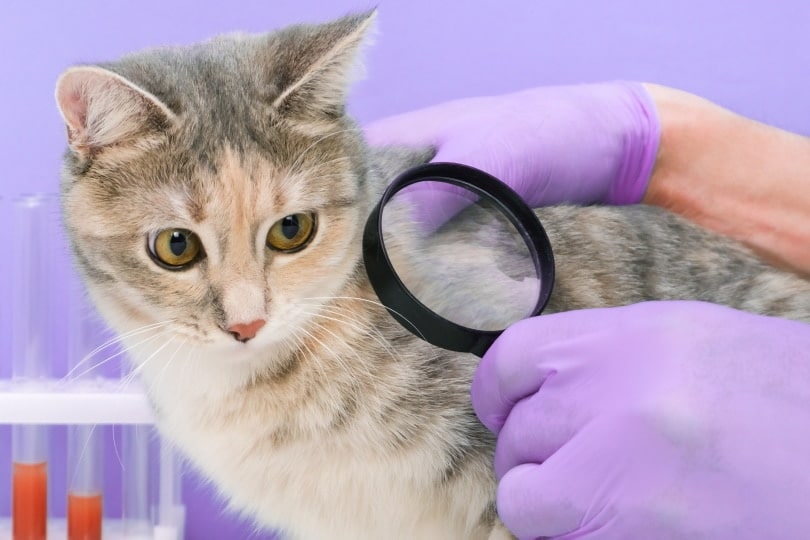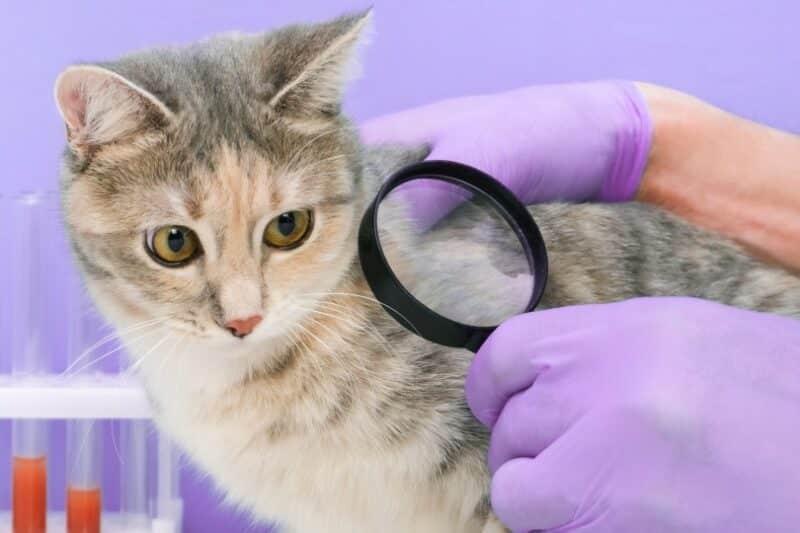Did you know that in addition to the traditional anti-flea products found at pet stores, you can use natural home remedies? These can be healthier for the pets and for the people around them. That said, natural remedies can be ineffective, especially for massive infestations.
Here’s what you can do to help your cat get rid of fleas.

The 11 Natural Home Remedies for Cats With Fleas
1. Bathing Your Cat
Even if your cat doesn’t like water, a bath can help them get rid of fleas. Before fully bathing your cat, put soap suds around your pet’s neck to prevent fleas from escaping to the dry area on the head. Use cat-safe shampoo to make sure you don’t cause any skin irritation.
After the bath, comb your cat with a special comb for fleas, which has short and closely spaced teeth. If your beloved pet still has fleas, you can repeat the procedure.
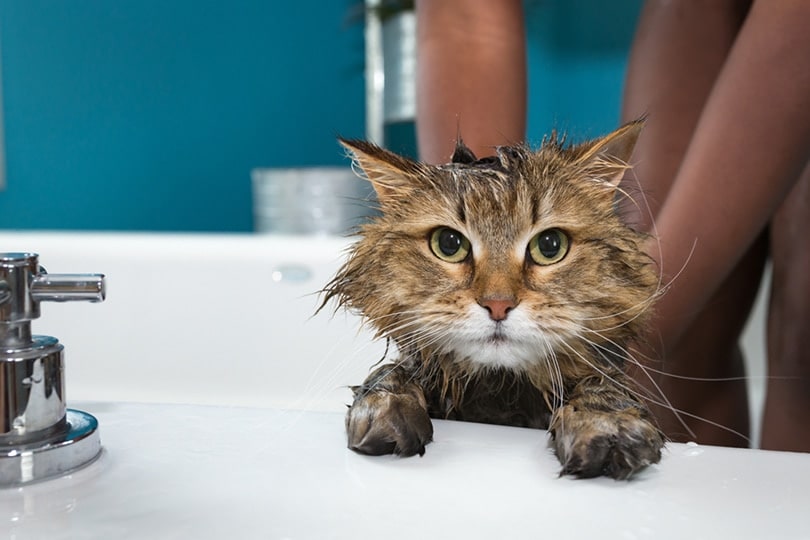
2. Vacuuming
Although fleas typically stay in your cat’s fur, they will leave their eggs in carpets, bedding, or dusty areas of the house. Getting rid of the fleas from your cat’s fur is only a temporary solution. Their eggs will remain inside your home, where they will develop and new fleas will emerge.
To get rid of fleas permanently, clean these areas regularly. Vacuum, change the bedding, and wipe away dust. Clean the carpets carefully, and don’t forget the spaces under the furniture where dust accumulates. Also, thoroughly mop the areas where you do not have carpets.
3. Combing Your Cat’s Fur Regularly
Regular combing of your cat’s fur can help you rid them of fleas, especially if they only have a few. To make this remedy more effective, use a flea comb.
When combing your cat, make sure you have a bowl of water and soap or dish soap (e.g., Dawn) in which to put the fleas and their eggs. Comb your cat daily with this comb until you are sure they are flea free. If time permits, comb your pet’s fur twice a day.
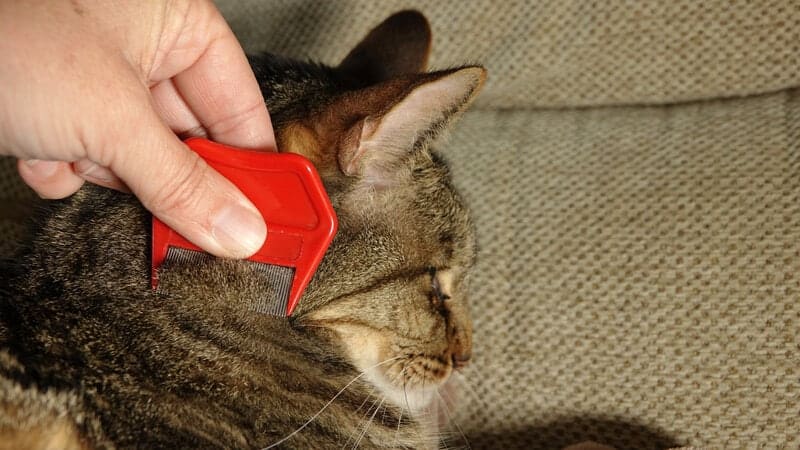
4. Non-toxic Traps
Place a bowl of warm water mixed with dish soap near the places where your cat frequently sleeps or in the middle of the room. Fleas will be attracted to the heat emanating from the water and fall into it; the dish soap will weigh them down so they sink and drown.
If you prefer not to put soapy water bowls near your cat, you can use electric traps designed for parasites.
5. Diatomaceous Earth
Diatomaceous earth is a good remedy against fleas because it has desiccant and abrasive properties. Use only food-grade diatomaceous earth because the other types are toxic to humans and animals (they contain traces of pesticides).
To rid your cat of fleas, sprinkle diatomaceous earth on their fur, and rub it in, especially on the neck and base of the tail. Put a cone on your cat so they do not groom off the diatomaceous earth, and make sure they do not inhale it (since it is abrasive, it can cause severe respiratory problems).
For moderate flea infestations, keep the diatomaceous earth on your cat for a day.
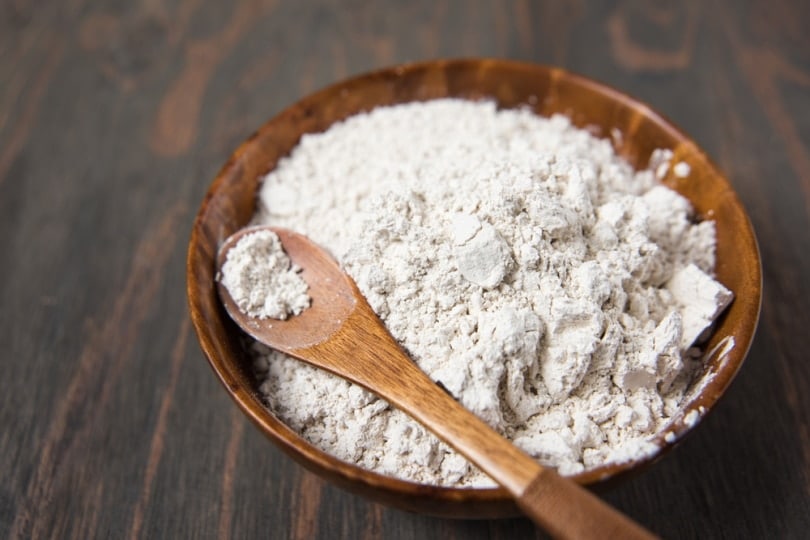
6. Vinegar
There are no studies proving that apple cider vinegar is effective for getting rid of fleas on pets. But many people use it and say that they have seen results. Apple cider vinegar is not toxic to cats, so it’s worth a try. It will not kill the fleas, but it can make them jump off your pet. Fleas dislike both its smell and taste.
Mix equal parts apple cider vinegar and water in a spray bottle. Spray your cat with this solution, but avoid spraying it on your pet’s eyes, ears, and nose. Repeat daily.
Generously spray the same solution on floors, windowsills, furniture, carpets, and other places where you may suspect fleas. Do it daily or as needed.
7. Coconut Oil
Coconut oil contains generous amounts of lauric acid, a natural flea repellent. It is not toxic to cats, thus being safer than many other home remedies.
You can use coconut oil as is (by rubbing it in your cat’s fur), or you can mix 2 tablespoons of coconut oil with 30 ml of warm water and spray it on your cat’s fur. Massage or comb the oil into your pet’s hair for maximum effectiveness.
If you choose to rub it into your cat’s fur, let it work for a while, and then wash your pet with cat shampoo.

8. Lemon Spray
Lemons are rich in d-limonene, a terpene with insecticidal properties that can help with flea infestations.
- Cut one to two lemons into thin slices.
- Put them in a saucepan with water, and bring to a boil.
- Turn off the heat and let the solution infuse overnight.
- Strain the solution and pour it into a spray bottle.
- Spray the solution on your cat until the skin is wet, avoiding the eyes, ears, and nose.
- Comb their fur well using a flea comb.
- Repeat as necessary.
You can even spray it on the areas where you suspect fleas. A cup of lemon juice can also be used in the washing machine when washing your cat’s bedding to kill any remaining fleas or flea eggs.
9. Lemon Flea Shampoo
Squeeze the juice from one lemon and mix it with 2 cups of water. Add this mixture to your cat’s shampoo. Wash your cat with lemon shampoo every 2 weeks or until the fleas are gone.
However, cats do not like the smell of citrus, and this remedy can cause them irritation and additional stress. Also, lemons are mildly toxic to cats; even a few drops of lemon juice ingested can cause gastrointestinal disorders (vomiting and diarrhea). So, use lemons on your cat with caution.

10. Salt
Salt has dehydrating effects on the bodies of fleas, their eggs, and their larvae.
- Sprinkle salt lightly but evenly on carpets, wooden floors, and other possible infested areas.
- Let it sit for 12–48 hours, then vacuum well.
- Do this regularly for at least 2 weeks.
You can also use salt water to clean hard surfaces or mix it with household cleaning products. Salt can cause poisoning in cats, though, so use it with caution. A few grams of salt per kilogram of body weight can make your cat sick if ingested.
- Vomiting
- Diarrhea
- Excessive thirst
- Bleeding
- Hematomas
- Severe neurological disorders
- Abdominal pain
- Seizures
- Coma
- Death
11. Baking Soda
Baking soda has the same properties as salt and can be used on carpets, furniture, and in the areas where your cat sleeps. It can also be used directly on your cat’s fur, but make sure your pet does not ingest it (comb them after 15–20 minutes).
As with salt, baking soda can cause poisoning in cats if ingested. Also, some cats can have allergic skin reactions to baking soda.


Conclusion
There are many natural home remedies to help your cat get rid of fleas, though nothing is as effective as antiparasitic products designed specifically for cats. Still, if you want natural remedies, you can use salt, baking soda, lemon, coconut oil, diatomaceous earth, vinegar, or Dawn dish soap. Remember that salt and baking soda can cause poisoning if ingested, and lemons are mildly toxic to cats. Also, avoid using any essential oils because most of them are toxic to cats.
Related Reads:
- Best Oral Flea Treatments for Cats – Reviews & Top Picks
- Best Flea Collars for Cats – Reviews & Top Picks
Featured Image Credit: lev.studio, Shutterstock

